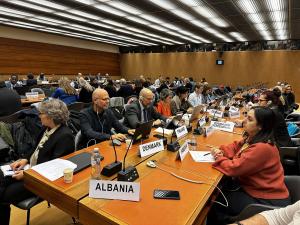
The Protocol on Pollutant Release and Transfer Registers (Protocol on PRTRs) sets international standards for reporting on pollutant releases from a range of economic activities, such as mineral industry operations, plastic production, waste and wastewater management or the rearing of poultry or pigs and intense aquaculture. The Protocol also regulates how data are made publicly available.
The recent meeting of the Working Group of the Parties to the Protocol on PRTRs gathered Parties, other member States and stakeholders from Africa, the Americas, Asia and Europe, to share experiences and improve coordination related to developing and modernizing reporting on pollutant releases and making easily available the data for decision-making purposes. Examples from countries, non-governmental and international organizations showed how data on releases of pollutants into the environment can be used to identify solutions to better manage waste, use water resources and nutrients from wastewater, or apply PRTRs to track progress in pollution reduction and meet commitments related to sustainable development, climate change and pollution. In that context, the use of PRTR systems to implement important principles of sustainable development such as the “polluter pays” principle was noted as a successful example.
If silos are to be broken down across sectors – one of the main requirements for achieving the Sustainable Development Goals and the transition to green and circular economies – then it is essential for PRTR databases to become interoperable and integrated with other sources of data. Participants shared experiences in developing PRTR systems, specifically their institutional and digital infrastructure, together with software solutions that facilitate data management and help to make databases interoperable for better and easier use in decision-making processes. For example, a project in South-Eastern Europe, funded by Germany, showcased the benefits of using the same open-source software in different countries with regard to cost-effectiveness and cooperation between countries, as a possible approach for other regions.
Furthermore, countries outlined that they apply PRTR infrastructure to other environmental- and circular economy-related data sets. In that context, the Working Group expressed appreciation to Ukraine for the progress it had achieved in its PRTR development within a wider environmental information system, despite the extraordinary circumstances due to the war launched by the Russian Federation against Ukraine.
Effective coordination, one of the main themes of the meeting, was highlighted by delegations as fundamental in tackling the pollution-related challenges that people face across the globe and that threaten the environment. Indeed, the pollution crisis is addressed by many national and international processes and programmes. The Protocol’s common standards for data management systems can help countries to avoid duplication of efforts, effectively address underlying data needs for decision-making, and set priorities efficiently.
Speakers presented relevant activities under the Basel Convention on the Control of Transboundary Movements of Hazardous Wastes and Their Disposal, the Rotterdam Convention on the Prior Informed Consent Procedure for Certain Hazardous Chemicals and Pesticides in International Trade and the Stockholm Convention on Persistent Organic Pollutants, the new Global Framework on Chemicals, the Convention for the Protection of the Marine Environment and the Coastal Region of the Mediterranean (Barcelona Convention), the Convention on Access to Information, Public Participation in Decision-making and Access to Justice in Environmental Matters (Aarhus Convention), the Convention on Long-range Transboundary Air Pollution, the UNECE Working Group on Environmental Monitoring and Assessment and the United Nations Environment Programme (UNEP)/Mediterranean Action Plan (MAP) and observed their linkages with the Protocol on PRTRs.
It was noted that PRTRs also play a twofold role in reporting data to governments and making data available for use by stakeholders. For example, PRTRs can support functions related to data quality and management, thereby helping to achieve objectives under the above-mentioned treaties and programmes. In conclusion, the Working Group called upon governments to strengthen cooperation between experts dealing with PRTR systems and other relevant instruments, as well as to promote PRTRs as a tool for fulfilling international reporting requirements under relevant multilateral environmental agreements. A representative of the United Nations Institute for Training and Research (UNITAR), in turn, invited interested countries and organizations to form a “Partnership on PRTRs”, aiming at fostering concrete actions to promote PRTRs.
The Working Group also considered preparations for the fifth session of the Meeting of the Parties to the Protocol on PRTRs, scheduled to take place in autumn 2025, including a proposal for the modernization of PRTR systems and the promotion of the Protocol, as well as its new work programme and future financial arrangements.
The meeting report, along with the presentations and other material, will be made available on the meeting web page.
Note to editors
By enhancing transparency and accountability, PRTRs can play a central role in promoting peaceful and inclusive societies and good governance (Sustainable Development Goal 16) across the 2030 Agenda for Sustainable Development. PRTRs can also make an important contribution to achieving specific Sustainable Development Goals, in particular Goal 3 (good health and well-being), Goal 6 (clean water and sanitation), Goal 9 (industry, innovation and infrastructure), Goal 11 (sustainable cities and communities) and Goal 12 (responsible consumption and production). The UNECE Protocol on PRTRs has been used across the globe as a prototype for establishing reporting by industry on pollutant releases and waste transfers and for providing public access to related information.
The Protocol on PRTRs, currently chaired by Slovenia, is the only legally binding treaty on this subject that is open for accession to all Member States of the United Nations. Together with partner organizations - the Organisation for Economic Co-operation and Development, UNITAR, UNEP and the European Environment Agency – UNECE is helping countries to establish effective PRTR systems that meet common international standards.

